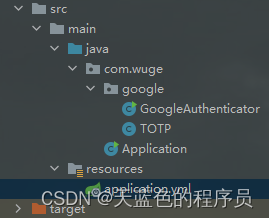首页 > 基础资料 博客日记
Google身份验证器Google Authenticator的java服务端实现
2024-05-11 11:00:07基础资料围观872次
本篇文章分享Google身份验证器Google Authenticator的java服务端实现,对你有帮助的话记得收藏一下,看Java资料网收获更多编程知识
Google身份验证器Google Authenticator是谷歌推出的一款基于时间与哈希的一次性密码算法的两步验证软件令牌,此软件用于Google的认证服务。此项服务所使用的算法已列于RFC 6238和RFC 4226中。谷歌验证器上的动态密码按照时间或使用次数不断动态变化(默认30秒变更一次)。
在本实现demo中,一共提供了四个接口,分别如下:
1、生成密钥
2、生成QR二维码
3、获取验证码
4、验证验证码是否正确
其中代码和接口注释说明非常详尽,可供参考,如遇问题欢迎可以留言沟通。
废话不多说,直接上代码,本次代码尽可能简单,最简单的结构附图,其中为了方便演示密钥使用了全局变量,在实际应用中应该采用《用户名:密钥》的绑定关系存储;

package com.wuge.google;
import org.apache.commons.codec.binary.Base32;
import org.apache.commons.codec.binary.Hex;
import org.springframework.util.StringUtils;
import javax.crypto.Mac;
import javax.crypto.spec.SecretKeySpec;
import java.io.UnsupportedEncodingException;
import java.net.URLEncoder;
import java.security.InvalidKeyException;
import java.security.NoSuchAlgorithmException;
import java.security.SecureRandom;
/**
* 谷歌身份验证器工具类
*
* @author wuge
*/
public class GoogleAuthenticator {
/**
* 时间前后偏移量
* 用于防止客户端时间不精确导致生成的TOTP与服务器端的TOTP一直不一致
* 如果为0,当前时间为 10:10:15
* 则表明在 10:10:00-10:10:30 之间生成的TOTP 能校验通过
* 如果为1,则表明在
* 10:09:30-10:10:00
* 10:10:00-10:10:30
* 10:10:30-10:11:00 之间生成的TOTP 能校验通过
* 以此类推
*/
private static int WINDOW_SIZE = 0;
/**
* 加密方式,HmacSHA1、HmacSHA256、HmacSHA512
*/
private static final String CRYPTO = "HmacSHA1";
/**
* 生成密钥,每个用户独享一份密钥
*
* @return
*/
public static String getSecretKey() {
SecureRandom random = new SecureRandom();
byte[] bytes = new byte[20];
random.nextBytes(bytes);
Base32 base32 = new Base32();
String secretKey = base32.encodeToString(bytes);
// make the secret key more human-readable by lower-casing and
// inserting spaces between each group of 4 characters
return secretKey.toUpperCase();
}
/**
* 生成二维码内容
*
* @param secretKey 密钥
* @param account 账户名
* @param issuer 网站地址(可不写)
* @return
*/
public static String getQrCodeText(String secretKey, String account, String issuer) {
String normalizedBase32Key = secretKey.replace(" ", "").toUpperCase();
try {
return "otpauth://totp/"
+ URLEncoder.encode((!StringUtils.isEmpty(issuer) ? (issuer + ":") : "") + account, "UTF-8").replace("+", "%20")
+ "?secret=" + URLEncoder.encode(normalizedBase32Key, "UTF-8").replace("+", "%20")
+ (!StringUtils.isEmpty(issuer) ? ("&issuer=" + URLEncoder.encode(issuer, "UTF-8").replace("+", "%20")) : "");
} catch (UnsupportedEncodingException e) {
throw new IllegalStateException(e);
}
}
/**
* 获取验证码
*
* @param secretKey
* @return
*/
public static String getCode(String secretKey) {
String normalizedBase32Key = secretKey.replace(" ", "").toUpperCase();
Base32 base32 = new Base32();
byte[] bytes = base32.decode(normalizedBase32Key);
String hexKey = Hex.encodeHexString(bytes);
long time = (System.currentTimeMillis() / 1000) / 30;
String hexTime = Long.toHexString(time);
return TOTP.generateTOTP(hexKey, hexTime, "6", CRYPTO);
}
/**
* 检验 code 是否正确
*
* @param secret 密钥
* @param code code
* @param time 时间戳
* @return
*/
public static boolean checkCode(String secret, long code, long time) {
Base32 codec = new Base32();
byte[] decodedKey = codec.decode(secret);
// convert unix msec time into a 30 second "window"
// this is per the TOTP spec (see the RFC for details)
long t = (time / 1000L) / 30L;
// Window is used to check codes generated in the near past.
// You can use this value to tune how far you're willing to go.
long hash;
for (int i = -WINDOW_SIZE; i <= WINDOW_SIZE; ++i) {
try {
hash = verifyCode(decodedKey, t + i);
} catch (Exception e) {
// Yes, this is bad form - but
// the exceptions thrown would be rare and a static
// configuration problem
// e.printStackTrace();
throw new RuntimeException(e.getMessage());
}
if (hash == code) {
return true;
}
}
return false;
}
/**
* 根据时间偏移量计算
*
* @param key
* @param t
* @return
* @throws NoSuchAlgorithmException
* @throws InvalidKeyException
*/
private static long verifyCode(byte[] key, long t) throws NoSuchAlgorithmException, InvalidKeyException {
byte[] data = new byte[8];
long value = t;
for (int i = 8; i-- > 0; value >>>= 8) {
data[i] = (byte) value;
}
SecretKeySpec signKey = new SecretKeySpec(key, CRYPTO);
Mac mac = Mac.getInstance(CRYPTO);
mac.init(signKey);
byte[] hash = mac.doFinal(data);
int offset = hash[20 - 1] & 0xF;
// We're using a long because Java hasn't got unsigned int.
long truncatedHash = 0;
for (int i = 0; i < 4; ++i) {
truncatedHash <<= 8;
// We are dealing with signed bytes:
// we just keep the first byte.
truncatedHash |= (hash[offset + i] & 0xFF);
}
truncatedHash &= 0x7FFFFFFF;
truncatedHash %= 1000000;
return truncatedHash;
}
public static void main(String[] args) {
for (int i = 0; i < 100; i++) {
String secretKey = getSecretKey();
System.out.println("secretKey:" + secretKey);
String code = getCode(secretKey);
System.out.println("code:" + code);
boolean b = checkCode(secretKey, Long.parseLong(code), System.currentTimeMillis());
System.out.println("isSuccess:" + b);
}
}
}
package com.wuge.google;
import javax.crypto.Mac;
import javax.crypto.spec.SecretKeySpec;
import java.lang.reflect.UndeclaredThrowableException;
import java.math.BigInteger;
import java.security.GeneralSecurityException;
/**
* 验证码生成工具类
*
* @author wuge
*/
public class TOTP {
private static final int[] DIGITS_POWER = {1, 10, 100, 1000, 10000, 100000, 1000000, 10000000, 100000000};
/**
* This method uses the JCE to provide the crypto algorithm. HMAC computes a
* Hashed Message Authentication Code with the crypto hash algorithm as a
* parameter.
*
* @param crypto : the crypto algorithm (HmacSHA1, HmacSHA256, HmacSHA512)
* @param keyBytes : the bytes to use for the HMAC key
* @param text : the message or text to be authenticated
*/
private static byte[] hmac_sha(String crypto, byte[] keyBytes, byte[] text) {
try {
Mac hmac;
hmac = Mac.getInstance(crypto);
SecretKeySpec macKey = new SecretKeySpec(keyBytes, "RAW");
hmac.init(macKey);
return hmac.doFinal(text);
} catch (GeneralSecurityException gse) {
throw new UndeclaredThrowableException(gse);
}
}
/**
* This method converts a HEX string to Byte[]
*
* @param hex : the HEX string
* @return: a byte array
*/
private static byte[] hexStr2Bytes(String hex) {
// Adding one byte to get the right conversion
// Values starting with "0" can be converted
byte[] bArray = new BigInteger("10" + hex, 16).toByteArray();
// Copy all the REAL bytes, not the "first"
byte[] ret = new byte[bArray.length - 1];
System.arraycopy(bArray, 1, ret, 0, ret.length);
return ret;
}
/**
* This method generates a TOTP value for the given set of parameters.
*
* @param key : the shared secret, HEX encoded
* @param time : a value that reflects a time
* @param returnDigits : number of digits to return
* @param crypto : the crypto function to use
* @return: a numeric String in base 10 that includes
*/
public static String generateTOTP(String key, String time, String returnDigits, String crypto) {
int codeDigits = Integer.decode(returnDigits);
String result = null;
// Using the counter
// First 8 bytes are for the movingFactor
// Compliant with base RFC 4226 (HOTP)
while (time.length() < 16) {
time = "0" + time;
}
// Get the HEX in a Byte[]
byte[] msg = hexStr2Bytes(time);
byte[] k = hexStr2Bytes(key);
byte[] hash = hmac_sha(crypto, k, msg);
// put selected bytes into result int
int offset = hash[hash.length - 1] & 0xf;
int binary = ((hash[offset] & 0x7f) << 24)
| ((hash[offset + 1] & 0xff) << 16)
| ((hash[offset + 2] & 0xff) << 8) | (hash[offset + 3] & 0xff);
int otp = binary % DIGITS_POWER[codeDigits];
result = Integer.toString(otp);
while (result.length() < codeDigits) {
result = "0" + result;
}
return result;
}
}
package com.wuge;
import com.wuge.google.GoogleAuthenticator;
import org.iherus.codegen.qrcode.SimpleQrcodeGenerator;
import org.springframework.boot.SpringApplication;
import org.springframework.boot.autoconfigure.SpringBootApplication;
import org.springframework.web.bind.annotation.GetMapping;
import org.springframework.web.bind.annotation.RequestParam;
import org.springframework.web.bind.annotation.RestController;
import javax.servlet.http.HttpServletResponse;
/**
* 项目启动类
*
* @author wuge
*/
@RestController
@SpringBootApplication
public class Application {
private static String SECRET_KEY = "";
public static void main(String[] args) {
SpringApplication.run(Application.class, args);
}
/**
* 生成 Google 密钥,两种方式任选一种
*/
@GetMapping("getSecretKey")
public String getSecretKey() {
String secretKey = GoogleAuthenticator.getSecretKey();
SECRET_KEY = secretKey;
return secretKey;
}
/**
* 生成二维码,APP直接扫描绑定,两种方式任选一种
*/
@GetMapping("getQrcode")
public void getQrcode(@RequestParam("name") String name, HttpServletResponse response) throws Exception {
String secretKey = GoogleAuthenticator.getSecretKey();
SECRET_KEY = secretKey;
// 生成二维码内容
String qrCodeText = GoogleAuthenticator.getQrCodeText(secretKey, name, "");
// 生成二维码输出
new SimpleQrcodeGenerator().generate(qrCodeText).toStream(response.getOutputStream());
}
/**
* 获取code
*/
@GetMapping("getCode")
public String getCode() {
return GoogleAuthenticator.getCode(SECRET_KEY);
}
/**
* 验证 code 是否正确
*/
@GetMapping("checkCode")
public Boolean checkCode(@RequestParam("code") String code) {
return GoogleAuthenticator.checkCode(SECRET_KEY, Long.parseLong(code), System.currentTimeMillis());
}
}
<?xml version="1.0" encoding="UTF-8"?>
<project xmlns="http://maven.apache.org/POM/4.0.0" xmlns:xsi="http://www.w3.org/2001/XMLSchema-instance"
xsi:schemaLocation="http://maven.apache.org/POM/4.0.0 https://maven.apache.org/xsd/maven-4.0.0.xsd">
<modelVersion>4.0.0</modelVersion>
<parent>
<groupId>org.springframework.boot</groupId>
<artifactId>spring-boot-starter-parent</artifactId>
<version>2.3.1.RELEASE</version>
<relativePath/>
</parent>
<repositories>
<!-- 指定仓库地址,提升速度 -->
<repository>
<id>aliyun</id>
<name>aliyun Repository</name>
<url>http://maven.aliyun.com/nexus/content/groups/public</url>
<snapshots>
<enabled>false</enabled>
</snapshots>
</repository>
</repositories>
<groupId>com.asurplus</groupId>
<artifactId>asurplus</artifactId>
<version>0.0.1-SNAPSHOT</version>
<name>asurplus</name>
<description>Google身份验证器</description>
<properties>
<project.reporting.outputEncoding>UTF-8</project.reporting.outputEncoding>
<project.build.sourceEncoding>UTF-8</project.build.sourceEncoding>
<java.version>1.8</java.version>
<codec.version>1.15</codec.version>
<qrext4j.version>1.3.1</qrext4j.version>
</properties>
<dependencies>
<!-- web支持 -->
<dependency>
<groupId>org.springframework.boot</groupId>
<artifactId>spring-boot-starter-web</artifactId>
</dependency>
<!-- 加密工具 -->
<!--密钥生成-->
<dependency>
<groupId>commons-codec</groupId>
<artifactId>commons-codec</artifactId>
<version>${codec.version}</version>
</dependency>
<!-- 二维码依赖 -->
<dependency>
<groupId>org.iherus</groupId>
<artifactId>qrext4j</artifactId>
<version>${qrext4j.version}</version>
</dependency>
</dependencies>
<build>
<finalName>google-auth</finalName>
<plugins>
<plugin>
<groupId>org.springframework.boot</groupId>
<artifactId>spring-boot-maven-plugin</artifactId>
</plugin>
</plugins>
</build>
</project>
文章来源:https://blog.csdn.net/wuge507639721/article/details/134514462
本文来自互联网用户投稿,该文观点仅代表作者本人,不代表本站立场。本站仅提供信息存储空间服务,不拥有所有权,不承担相关法律责任。如若内容造成侵权/违法违规/事实不符,请联系邮箱:jacktools123@163.com进行投诉反馈,一经查实,立即删除!
本文来自互联网用户投稿,该文观点仅代表作者本人,不代表本站立场。本站仅提供信息存储空间服务,不拥有所有权,不承担相关法律责任。如若内容造成侵权/违法违规/事实不符,请联系邮箱:jacktools123@163.com进行投诉反馈,一经查实,立即删除!
标签:

